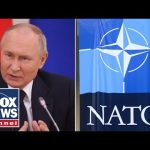NATO peacekeepers probably won’t be sent to Ukraine, according to former Trump deputy national security adviser K.T. McFarland. She says the idea doesn’t make much sense for Russia or the West. Instead, McFarland suggests other countries could step in to act as a buffer between Ukraine and Russia. This comes as President Trump pushes for new ways to end the war without dragging NATO deeper into conflict.
President Trump’s team is focused on cutting deals that protect American interests first. McFarland says Trump’s plan includes major economic projects in Ukraine, like mining rare-earth minerals. Having American workers on the ground could deter future Russian attacks. “If there’s anybody who won’t want to invade, it’s the Russians invading where Americans are sitting,” she explained. This strategy avoids putting U.S. troops in harm’s way while still keeping Russia in check.
Ukrainian President Volodymyr Zelenskyy has demanded NATO membership or nuclear weapons to guarantee his country’s safety. But Trump’s special envoy, Keith Kellogg, shut down the nuclear option fast. “The chance of them getting nuclear weapons back is somewhere between slim and none,” he said. NATO allies also resist letting Ukraine join, fearing it would escalate tensions with Russia instead of bringing peace.
European leaders have relied too long on America to handle security in their backyard, critics argue. McFarland says Trump wants Europe to take charge of its own defense rather than leaning on U.S. troops and cash. This matches Trump’s longtime push for NATO countries to pay their fair share. If Europe won’t step up, the alliance could crack under pressure from Russia and internal disagreements.
Some worry a peace deal might let Russia regroup and attack again later. McFarland compares these fears to old mistakes in Vietnam and Afghanistan but says Trump’s plan is different. By tying America’s economy to Ukraine’s future, the U.S. creates a stake in keeping the region stable. “This isn’t about surrender,” she said. “It’s about smart power.”
Democrats and global elites have slammed Trump for talking directly to Russia’s Vladimir Putin. They claim it weakens Ukraine’s position. But McFarland says refusing to negotiate got nowhere under Biden. “For three years, nobody talked to the Russians,” she said. “Now we’re finally leading instead of following.” Talks are still early, but Trump’s team insists progress beats endless stalemate.
Russia claims it will never accept NATO peacekeepers in Ukraine. That leaves few options besides creative solutions outside traditional alliances. McFarland hints that neutral countries or private deals could fill the gap without provoking Moscow. The key is ending the bloodshed while avoiding World War Three—a balance Biden failed to strike, Trump supporters argue.
As the war drags into its third year, Americans are tired of writing blank checks to Ukraine. Trump’s focus on business ties over troop deployments aligns with voters who want results, not forever wars. McFarland says critics just aren’t used to Trump’s tough deal-making style: “He’s stirring things up to get this solved.” For conservatives, that’s exactly the shake-up Washington needs.




